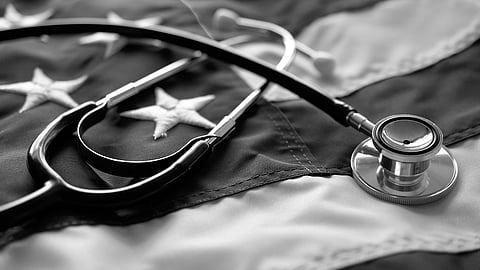OPINION | King County Veterans Face High Mesothelioma Risk. A National Registry Could Help.
by Jonathan Sharp
The sacrifices made by veterans are woven into the nation's foundation, but for many of them, the aftermath of their service carries a silent and deadly burden. Several service members were unknowingly exposed to asbestos during their active duty, leaving them at high risk of developing mesothelioma. This aggressive and incurable cancer often remains undetected until it is too late for effective treatment. Making this disease more challenging is its frequent misdiagnosis, which leads to delayed and inadequate care.
King County is home to over 104,500 veterans, many of whom reside in South Seattle and South King County. This population tragically faces a significant risk of growing mesothelioma due to the nature of their profession. Monitoring them to detect any health condition they might have developed over time is critical.
A national mesothelioma registry could be a life-saving solution to combat this crisis. Such a systemic database would ensure at-risk individuals are identified sooner, inviting them to proactive screenings that could give them accurate diagnoses and prescribe the care they need.
The Persistent Mesothelioma Crisis and Its Impact on Veterans
Mesothelioma is a malignant tumor that predominantly grows in the protective lining of the lungs, abdomen, and heart. Studies show this aggressive cancer is most commonly caused by exposure to asbestos — a natural mineral once lauded for its excellent strength and heat resistance. The disease is particularly perilous because of its long latency period, which means its initial symptoms often emerge two to five decades after exposure. And when they finally do, they are frequently confused with other ailments, consequently resulting in misdiagnosis, inappropriate treatment, and poor prognosis.
This silent crisis has unfortunately taken a devastating toll on Washington. Between 1999 and 2017, the Evergreen State logged 9,200 asbestos-related fatalities, of which 1,604 were attributed to mesothelioma. King County specifically saw 1,891 deaths — the highest number recorded statewide. Even though this issue concerns the entire society, veterans have been disproportionately affected. Statistics indicate they account for 30% of nearly 3,000 Americans diagnosed with mesothelioma annually. Several of these veterans inhaled or ingested asbestos when being stationed at military facilities in South Seattle, like Joint Base Lewis McChord, and working in shipyards, such as the Duwamish Shipyard.
The Grim Reality of High Misdiagnosis Rates
One of the most disconcerting challenges in the fight against mesothelioma is its frequent misdiagnosis. It primarily stems from difficulty recognizing early symptoms — including fever, shortness of breath, chest pain, fatigue, and unexplained weight loss — often mistaken for other common conditions, such as pneumonia. That is why numerous veterans remain undiagnosed for months or even years, during which the cancer continues to spread. When a proper diagnosis is made, mesothelioma may have already progressed to a later and less treatable stage.
The impact of these delays is severe. Studies have shown that a significant number of mesothelioma diagnoses were initially incorrect. In fact, 80.8% of stage 1 cases were wrong and later "upstaged" to more advanced stages, while 69.5% of those at stage 2 were misdiagnosed. This problem persists even in advanced stages, with 35.4% of stage 3 diagnoses inaccurate and 12.8% of stage 4 cases misdiagnosed. This high rate of misdiagnosis is not just a minor inconvenience — it drastically reduces the survival chances of veterans, as early detection and treatment are both crucial to improving health outcomes.
Resolving the Mesothelioma Crisis Through a Systemic Approach
A national mesothelioma registry could be a powerful tool in tackling this issue, as it would collect data on at-risk veterans and prioritize them for screenings. This systemic approach would help health care providers detect the disease as early as possible and prescribe the most appropriate treatment to improve the prognosis. In addition, this registry would also streamline access to health care and disability benefits — ensuring veterans receive the care and financial support they deserve.
Further, researchers would finally have updated data they could use to study the progression of mesothelioma and develop better treatment models. Currently, it takes two years for new cases to be included in the national database, making it incredibly difficult to match patients as potential participants in life-saving research. And because of the aggressive nature of the disease, many of them may have already passed away before they could even benefit from any health care service.
The failure to protect our veterans from the deadly consequences of asbestos exposure is unacceptable. With this, it is high time for the Department of Veterans Affairs and the Department of Defense to take a proactive step by teaming up with health organizations to establish a national mesothelioma registry. Their combined expertise and resources could significantly make all the difference in the pursuit of combating mesothelioma, which continues to affect service members today. People should realize that this initiative is not merely a policy change but a moral imperative that will save our dedicated veterans from suffering too much from our current fragmented health care system.
The South Seattle Emerald is committed to holding space for a variety of viewpoints within our community, with the understanding that differing perspectives do not negate mutual respect amongst community members.
The opinions, beliefs, and viewpoints expressed by the contributors on this website do not necessarily reflect the opinions, beliefs, and viewpoints of the Emerald or official policies of the Emerald.
Jonathan Sharp is the CFO of the Environmental Litigation Group, P.C. The firm's headquarters is in Birmingham, Alabama, and is ready to extend legal services to victims of toxic exposure and their families.
Help keep BIPOC-led, community-powered journalism free — become a Rainmaker today.


